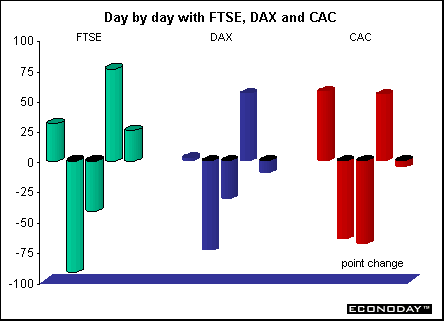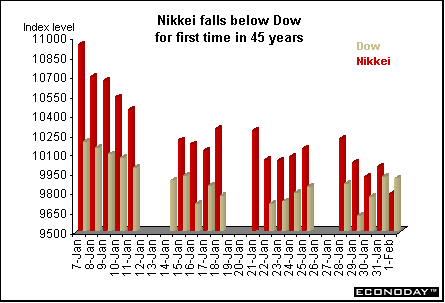
Europe and Britain
Despite the good news that manufacturing in Europe and Britain is beginning to find a bottom, investors continued to worry about the outpouring of earnings results. Investors worry if the numbers are real given the hangover from the Enron debacle that continues to plague investors with doubts. Investors worldwide have always considered U.S. accounting standards as the best in the world and are now uncertain about how to interpret the arcane data apparent in some earnings reports. And this was reflected in trading, which carried the London FTSE 100, Paris CAC and Frankfurt DAX lower on the week and for the first month of 2002. The indexes also continued to be weighed down by U.S. market performance and economic indicators as traders watched developments across the pond.

Concern about corporate telecommunications debt was also responsible for pushing the European benchmarks lower in January. The sector's problems dimmed optimism for an economic recovery and its losses offset gains in economically sensitive stocks, including chemical, paper and mining. Even as some European companies missed debt payments or renegotiated loans, signs that economies are rebounding prompted some investors to buy selectively. At a time when the economy is starting to turn upwards, it is typical to get debt and bankruptcy problems. There is a consistent lag of about six months between an economic recovery and an improvement in corporate cash flows.
Asia
The Nikkei dropped 353 points this week to close below 10,000 for only the third time since 1984. The index also closed below the Dow Jones Industrial Average for the first time since 1957. The Dow's lead represents a staggering reversal of fortune. In the late 1980s, the Japanese stock market was briefly worth more than the rest of the world's stock markets put together, with the Nikkei 14 times higher than the Dow. Since its peak of 38,915 at the end of 1989, the Nikkei has fallen 75 per cent while the Dow has risen 260 per cent.

With the end of the Japanese fiscal year looming on March 31, market players are particularly concerned about Japan's ailing banks. Deposit insurance is being removed from the banks and this is the month when banks' equity investments have to be marked to market. That means that the banks will have to value equities investments at current market value rather than the purchase price. With the Nikkei about 25 percent below its level of last year, this could cause a huge banking crisis.


Last Week's Highlights • Global Stock Market Indexes • Recap of Global Markets • Currencies • Indicator Scoreboard

The Bottom Line • Looking Ahead
|